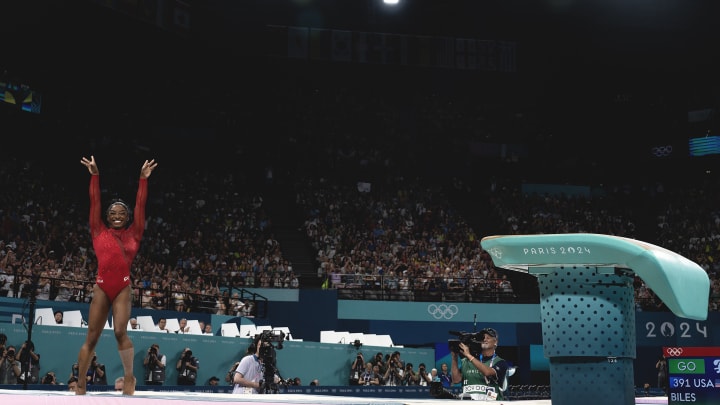Simone Biles Conquers the Vault to Capture Third Gold Medal of the Paris Olympics

PARIS — Even Simone Biles sometimes gets caught up in the legend of Simone Biles.
As she stood atop the podium during Saturday’s vault final, preparing to unleash the flips that would earn her her third gold medal of these Olympics and her 10th overall, her coach Laurent Landi signaled to her: Wait.
“Obviously once you get up there, your adrenaline is pumping,” she said afterward. “He wanted to make sure that I was staying calm and going on my own time, even though the thing said GO and everybody started cheering.”
As she has all Olympics, Biles blocked out the expectations of others and focused on her own. She took a breath and began sprinting down the runway. When she landed the Yurchenko double pike vault that bears her name—the Biles II, one of five eponymous skills—it was all but over.
She sealed gold with a less complicated vault that made her combined score a preposterous 15.300. Brazil’s Rebeca Andrade, the best gymnast on earth not named Biles, and the 2023 world champion in the vault, finished second with a score of 14.966. Jade Carey, who has spent the past three years reliving the instant when she stumbled on the runway in Tokyo and finished last in this event, took bronze.
Biles had lamented Andrade’s skills after Thursday’s individual all-around final, saying, “I don’t want to compete with Rebeca no more! I’m tired! She’s way too close.” On Saturday, after Andrade’s first vault, Biles turned to Carey, grinned and shrugged dramatically, as if to say, “What are we supposed to do about her?”
But Biles, 27, had already done what she needed to do, and everyone in Bercy Arena knew it. Her difficulty score is so high that as long as she stays on her feet, it’s almost impossible for anyone else to match her. Andrade actually executed her vaults better, by more than two-tenths of a point, but it didn’t matter.
This was Biles’s fourth Yurchenko double pike in competition this week—once in the qualifiers, once in the team final, once in the individual all-around—and she said she would be retiring the skill.
“I mean, I kind of nailed that one,” she said with a grin.
As for herself, she was less decisive. “Never say never,” she said. “The next Olympics is at home, so you never know. But I am getting really old.”
As she has all week, Biles set records in both age and decoration: She became the oldest woman to win gold in the vault since Ekaterina Kalinchuk, representing the Soviet Union, did so at 30 in 1952, the first time women’s gymnastics were contested at the Olympics. And Biles’s gold today, her second on vault after she also won in Rio, tied her with runner Allyson Felix for second most golds by a U.S. woman. (Swimmers Jenny Thompson and Katie Ledecky each have eight.) Biles also now owns 40 Olympic and world championship medals, 30 of them gold.
Although Saturday’s vaults were smooth, the process of getting there was not. In Tokyo, it was on the vault, of course, that the twisties that had dogged her for weeks became insurmountable. She fell out of her vault—an Amanar, which entails two and a half twists—during the team final and withdrew from event after event before stripping the twisting elements from her balance beam routine and gutting out a bronze medal. She took a year off from practicing and two off from competition before returning in 2023, and she initially performed the Amanar again, but she scrapped it in favor of the Biles II, which has two flips but no twists.
That was at Landi’s request, he said afterward, pointing out that even a one-point deduction for a fall on the Biles II would bring her score down only to the start value for the Amanar. "So what the hell?" he said.
“I think we’re both still a little bit traumatized [from] Tokyo,” Biles said. “And we’re excited that I can do multiple vaults, so that we don’t have to use the two and a half.”
Otherwise, she said, her mental health is in good shape as she heads into her final two events here, Monday’s beam final and floor exercise final. She has been speaking frequently with her therapist, despite the time difference, but she felt that she did not need the extra support on Saturday morning. She has insisted that after so many years of worrying about what other people thought, she is focused only on herself. She did, however, make time to comment on all the people who questioned her in Tokyo. “They’re really quiet right now,” she noted.
Her fans are not. But gymnastics, Landi said, “is in the head, more than the physical aspect.” And all week, Biles has been able to ignore the noise
